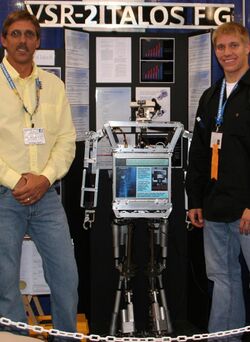Engineering:VSR-2: Talos FG
 VSR-2 Talos FG (v. 2.0.5) with its developer Adam Halverson (right) and co-funder Brad Halverson (left). |
VSR-2: Talos FG is a 155 cm (5 foot 1 inch) 118 lbs. humanoid robot created by Garretson High School Senior Adam Halverson in 2010. It is the result of three years of automaton development geared towards the creation of a functional and economically feasible service robot.
Development
The research leading up to Talos FG centered on humanoid walking ability and the challenges it faces. The development phases prior to VSR-2: Talos FG lasted three years and included two other humanoid robots: X-Species 2 and VSR-1: Talos. The development phases for Halverson's full size robot began in 2007 as a high school science fair project, however, the research into affordable humanoid robotics began as far back as 2005 in his middle school years and included his former partner, Anthony Winterton.
Name
The prefix 'VSR-2' is an acronym meaning Variable Sequenced Robot - 2nd Model. The name 'Talos' originated in Greek mythology, and was a giant man of bronze who protected Europa in Crete from pirates and invaders by circling the island's shores three times daily while guarding it. It is sometimes referred to as history's first recorded concept of a humanoid robot. 'FG' is another acronym meaning Final Generation, as this was the last model of Halverson's VSR series of robots.
Mechanical accomplishments
"VSR-2: Talos FG" is based primarily around a lower body support system of servo-controlled linear actuators, which are powered by an internal computer and electrical system. The actuators and unique ball joint design allows the unit's legs to function similar to the human by mimicking the contracting nature of the muscles, but with the complementing ability to 'push' the limb the opposite direction, removing the need for opposing actuators.
The highly stable nature of the linear actuators and their ability to hold position in low-power situations significantly reduced electrical consumption compared to the more common robotic limbs powered by volatile rotary servos. This solved many humanoid robotic issues such as lack of/short-term internal power supply, voltage spikes, inconsistent stability, and collapsing during processing and/or power failures.
The very first time VSR-2: Talos FG took successful steps was on March 22, 2010.
History
Garretson High School student Adam Halverson is credited with the development of VSR-2: Talos FG and her prototypes. He started a temporary umbrella company called Adrionic Technologies to build it under and developed three prototypes over the course of his high school career, which won him three all-expense-paid trips to compete at the Intel International Science and Engineering Fair in 2007, 2008, and 2010. VSR-1: Talos was developed with the help of his former research partner, Anthony Winterton & ACRS, and was the final prototype before developing the successful automaton VSR-2: Talos FG.
Talos FG was awarded 2nd place Overall in the Engineering category at the International Science and Engineering field held in San Jose, 2010, and earned several thousands in both cash and savings bonds from the U.S. Army, Intel, and the Cade Museum for Creativity and Invention.
After winning 2nd place in San Jose, CA, Adam Halverson and Talos: FG were featured in articles across the web and on Engadget.com
Talos FG was also shown on local news broadcasts near Adam Halverson's hometown of Garretson, SD, on a KDLT News Report and a Keloland News Report. It was also aired on CBS 5 and the school broadcasting station Channel One as a highlight of the 2010 Intel ISEF fair.
VSR-2: Talos FG is now located at South Dakota State University where its inventor, Adam Halverson, plans on advancing the machine with fluid walking dynamics and navigational intelligence later in his upcoming years.
References
- https://www.engadget.com/2010/05/14/high-school-senior-builds-walking-robot-the-vsr-2-talos-fg-vi/
- http://www.sdstate.edu/sciencefair/awards/grand-winners.cfm
- http://www.keloland.com/NewsDetail6162.cfm?Id=101241
- http://www.kdlt.com/index.php?option=com_content&task=view&id=3104&Itemid=57
- http://www.societyforscience.org/document.doc?id=203
- http://www.intel.com/pressroom/archive/releases/2010/20100510edu.htm
